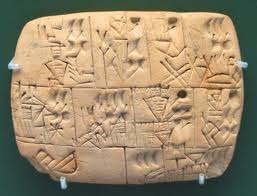As I concluded (well, started too) in my post "On ideas, originality and creativity" humanity doesn't come up with new, fresh or original ideas that are completely disconnected from any other idea out there. It is impossible.
And yet, in the creative field of writing there is an enormous pressure upon writers to come up with just that. The pressure comes from the public and from the industry itself. It is strong enough that even those starting out in writing or who want to feel the pressure to write on something that's never been written before. Failing to think of anything usually ends with a failure to write.
It is a utterly impossibility to come up with something completely new but the current state of our own propaganda, copyright system and our belief that "we can do anything" as long as we try makes many a beginner or aspiring writer believe they can and should do the impossible.
We can't. Don't even bother worrying over the fact that we can't. Just do what you can, solve what you can, work hard and you'll see benefits. That's what we humans excel at and what has brought humanity to this point (yes, some of you may be saying we should have done it all differently but that's hindsight and working with more knowledge than we had then. There is a certain number of us being pointedly blind and corrupt but this isn't to the point of everyone throughout our history has been).
Individual humans are like worker ants in a swarm. We learn what we learn and work within those principles alone while others learn something else and do something else. Separately we work on what we each believe important and join forces with some who share similar views. Altogether our achievements are in the masses and reach far beyond what any single person could ever do. This, we should be proud of. It is a rather efficient method of ensuring pretty much any possibility we know of gets explored somehow, often repeatedly for different variables, and our collective knowledge therefore expands with the results.
As you can see, I find Isaac Asimov's long distance views of humanity quite interesting to read.
So if we all work with separate little pieces of knowledge on life, the universe and everything and (as noted in "On ideas, originality and creativity") produce new or not so new blends of ideas we've separately encountered there will be many an overlap of ideas produced.
Everyone capable of writing knows about death, betrayal, love, war, hate, suicide etc etc. Everyone is concerned in some way or another with the young and the old, whether they are of these classes or not. Everyone has beliefs as to what happens after death though not everyone agrees as to what: nothing, something unimaginable, a strict structure or a reincarnation.
2001 Booker Longlist novels broken down by theme.
Can't read the main themes?
Death
Love
Betrayal
Corruption and Theft
War
Suicide
Running Away
Only one lighthearted topic there and it is probably tinged with betrayal.
Are you wracking your brain right now trying to think of something to prove me wrong? Don't bother.
Put simply, you can't. But like before, don't even bother worrying over the fact that you can't.
Originality, newness and uniqueness is never found in its pure form. Just as truth is never found in its pure form. You will never create it no matter how smart you think you are or how original you think your current work or idea is. Your idea, work and smartness do not revolve around complete, pure originality. It revolves around how you blend what you know together, how you write this blend down and on what you focus upon amongst the miriade themes, events and issues that appear in your work.
On the opposite end of the scale there is this old saying on monkeys and typewriters. "The infinite monkey theorem states that a monkey hitting keys at random on a typewriter keyboard for an infinite amount of time will almost surely type a given text, such as the complete works of William Shakespeare."
Probability may say so but I highly doubt it would ever happen because the probability is so incredibly small. Besides, why bother? We already have the original and making monkeys do it is about the only novelty there is in producing another copy. If you find monkey slavery amusing at all.
Authors, writers and prospectives shouldn't feel so under pressure to come up with original ideas that have never been broached before. The pressure of copyright is there so you don't act the monkey and type out Shakespeare's plays to claim for yourself. It isn't there to force you to come up with something completely unheard of before, despite the pressure you feel.
Write with the knowledge that you can pay hommage to others, especially if you reference them. Write with the knowledge that you are allowed to touch on subjects, themes and characters other people have created or written as long as you alter them enough through actions, encounters, personalities, placements etc to be your own versions. Or reference them.
Copyright is there so that you pay your dues to the one who developed or owns the little idea you're using without altering. And fair enough, even if this is a complete distortion of how humanity has worked with ideas before copyright. In this case copyright is mostly progression (some disadvantages are included) because it does force you not to mimic word for word, idea for idea, thus promoting heightened change and development.
In a world where we can only blend the ideas already floating about we shouldn't force ourselves to write beyond what is possible. As with every other field we should challenge the impossible, expand our views and discover as much as we can through reforming ideas, exploring the possibilities of new discoveries humanity has made and heightening our collective knowledge and understanding by writing on every theme possible, not just the few labelled in that diagram above.
Collectively, writers shed light on everything for everyone, through recording and reformatting information, so that we can all consume knowledge and then act as we believe we should. If there is anything to worry about in writing and publishing it isn't coming up with a completely new idea that's never been heard of before. It is on shedding light upon the most unlikeable, troubling, problematic and disturbing aspects of ourselves and our world and hoping it will be accepted by a publisher.
Luckily gritty reads are believed mostly palatable and acceptable because they challenge a reader and cause a stir. You'll only be rejected for works that cross popularly help beliefs on common decency as well as moral and ethical acceptability.




